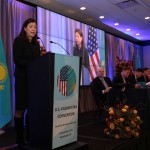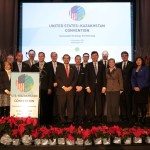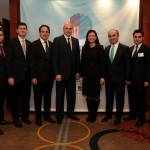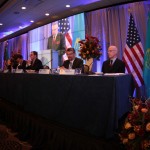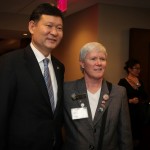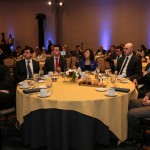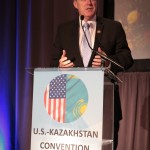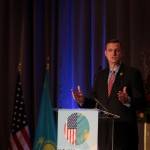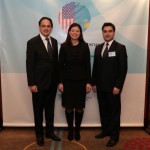US – Kazakhstan Strategic Partnership Convention
The Convention took place on Wednesday, December 11th at the Hyatt Regency on Capitol Hill in Washington, D.C., and featured a Breakfast and Opening Ceremony and two Panel Sessions. The theme of the Convention was “Successful Strategic Partnership” between the United States and the Republic of Kazakhstan. Distinguished attendees were 22 U.S. Members of Congress, including 2 U.S. Senators, in addition to representatives from the U.S. State Department, the IMF, General Electric and prominent D.C. think tanks and research institutions.
The Convention was co-organized by the Embassy of the Republic of Kazakhstan, the Turkic American Alliance, the Council of Turkic American Associations, the Turquoise Council of Americans and Eurasians and the Kazakh American Friendship Council. We thank all those who attended this premier event and look forward to enduring and strengthening relations between the United States and the Republic of Kazakhstan.
Session I of the U.S.-Kazakhstan Convention centered on the theme of “United States-Kazakhstan:
Strategic Partnership.”
The session moderator was James F. Collins, Carnegie Endowment Director for Russia and Eurasia.
Introductory remarks were provided by U.S. Senator Kelly Ayotte of New Hampshire. Senator Ayotte discussed how the U.S. was the first country to recognize Kazakhstan as an independent nation in 1991. The Senator went on to describe the 1994 bilateral investment treaty between the U.S. and Kazakhstan as the first step to increased facilitation of trade and investment. Since then, Kazakhstan has played key roles in advancing security in the region by preventing terrorism, engaging in peacekeeping and participating in the Steppe Eagle joint exercises between the U.S., Kazakhstan and the UN. Kazakhstan has also played a critical role in the Northern Distribution Network; in financing a $50 million program to educate Afghan students in Kazakhstan; and through its outstanding commitment to nuclear nonproliferation. In the field of nuclear nonproliferation, Kazakhstan has divested its Soviet-era nuclear warheads and highly enriched uranium, it has become a member to international nonproliferation treaties, and it has hosted two rounds of P5+1 negations in 2013 over Iran’s nuclear program. Nonetheless, Kazakhstan and the greater Eurasian region must employ greater economic integration, empowerment and freedom for women in the long-run.
 Turkish Cultural Center New Hampshire Turkish Cultural Center New Hampshire
Turkish Cultural Center New Hampshire Turkish Cultural Center New Hampshire

